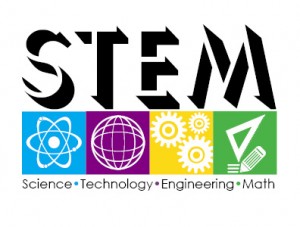

The guidelines from the NGSS, STEM, and the State Standards are the guidelines used by public, charter and private schools nationwide (in the U.S.) to establish their curriculum base. (If you're looking for my personal recommendations of what kids should learn by grade level, click here. This page deals only with how the e-Science program meets/exceeds current national standards.)
One of the two biggest misconceptions is that there are new Common Core Standards for science. There is no Common Core for Science. The only science in the Common Core deals with literacy, and it’s minimal.
The other big misconception is that the NGSS is a curriculum that lets teachers and parents know what to teach their kids. It’s not… it’s a set of performance expectations that indicate what students should be able to do at the end of the year (or years) of instruction. The NGSS doesn’t specify how to teach or plan instruction to help students achieve the performance levels specified.
The NGSS is expected to begin implementation in schools that have adopted these standards starting in 2017 at the earliest. The science curriculum framework based on NGSS was completed in 2016. Please note that U.S. science standards vary by state. (The information on this page is intended as a guideline only. If you need to cover evolution, please refer to your state guidelines for specific requirement details.)
I’ve listed the most important ideas about NGSS here:
- Science education reflects the interconnected nature of science as it is practiced and experienced in the real world.
- The NGSS are student performance expectations, not
- The NGSS focus on deeper understanding of content as well as how to apply it in the real world.
- Science and Engineering build coherently, and are integrated from K-12.
- The NGSS are designed to prepare students for college, career, and citizenship.
NGSS is a framework for learning science, however I didn’t find it complete by itself. I’ve taken the Next Generation Science Standards, key concepts from STEM, and my own personal teaching experience in both K-12 classrooms and at the college level and combined them to create the best science education program available, bar none.
In this document, you’ll find just the NGSS standards arranged by science concepts (key objectives, educational benchmarks, curriculum standards, assessment norms… all the same thing) that are broken down by grade level and topic area so you can teach these big ideas one bite at a time. The e-Science program (the program you're in right now) is aligned with this program in most ways (more on this in a minute).
The bottom line is that when your student is done with a section, you want them to not only know about teach science concept, but understand and be able to teach it back to you in way that really shows their level of comprehension based on the experiments they’ve done and conclusions they’ve made. I’ve added hundreds of hands-on science labs to the core concepts to support the science principles they are correlated to.
As kids work through these science experiments, they will be able to roll around with the concepts. They can see, hear, and experience it for themselves, and store that information in lots of places in their mind. Your kids will be learning real scientific stuff without it feeling like it.
Kids who just read about science or look at pictures of experiments but have never tried to do an experiment are trying to build on abstract ideas and usually miss out and don’t learn nearly as much as when they actively participate in the learning process.
As I mentioned before, I didn’t feel that this new set of standards was complete enough on its own, so I have combined it with standards and personal experience in the classroom to give your students the absolute best science education under their belt by the time they graduate from high school.
NOTE: If you need to only follow the NGSS framework, and you wish to use the e-Science program, you’ll need to make a couple of tweaks along the way to cover the standards recommended by the NGSS framework. Please note that I do not recommend using solely the NGSS. However if you’re already locked into using NGSS, I’ve created this document to help you get the most effective use of the e-Science program.
